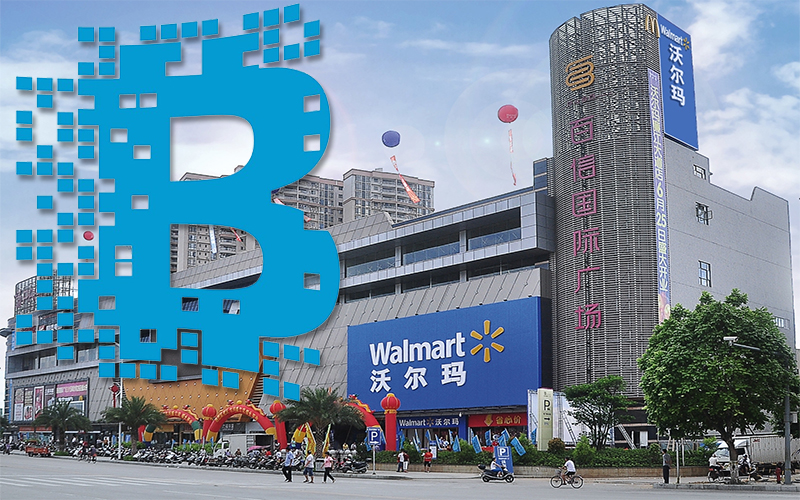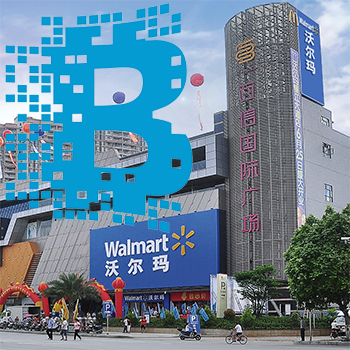Walmart, IBM and Tsinghua University Explore the Use of Blockchain in the Supply Chain

Global retailer joins pilot project with academics and technology experts to showcase leadership in food traceability efforts and help bring safer food to dinner tables across China.
As Walmart opened its new Walmart Food Safety Collaboration Center in Beijing yesterday, IBM, Walmart and Tsinghua University announced a collaboration to improve the way food is tracked, transported and sold to consumers across China.
By harnessing the power of blockchain technology designed to generate transparency and efficiency in supply chain record-keeping, this work aims to help enhance the safety of food on the tables of Chinese consumers.
Food authentication and supply chain tracking is a critical step to quickly finding and helping address sources of contamination around the world.
Early indications are that Blockchain presents an innovative new way to accomplish these goals.
It provides a permanent record of transactions which are then grouped in blocks that cannot be altered. It could serve as an alternative to traditional paper tracking and manual inspection systems, which can leave supply chains vulnerable to inaccuracies.
With blockchain, food products can be digitally tracked from an ecosystem of suppliers to store shelves and ultimately to consumers.
When applied to the food supply chain, digital product information such as farm origination details, batch numbers, factory and processing data, expiration dates, storage temperatures and shipping detail are digitally connected to food items and the information is entered into the blockchain along every step of the process.
Each piece of information provides critical data points that could potentially reveal food safety issues with the product. The information captured in each transaction is agreed upon by all members of the business network; once there is a consensus, it becomes a permanent record that can't be altered. This helps assure that all information about the item is accurate.
The record created by the blockchain can also help retailers better manage the shelf-life of products in individual stores, and further strengthen safeguards related to food authenticity.
The collaboration of Walmart, IBM and Tsinghua University takes advantage of the distinctive strengths of each member of the team. Scientists from IBM Research - China are among the leading edge technologists at IBM now in the forefront of the rapid evolution of blockchain.
Working alongside top talent in transaction security and authentication technology from Tsinghua University and with Walmart's expertise in supply chain, logistics and food safety, they are creating a new model for food traceability, supply chain transparency and auditability using IBM Blockchain based on the open source Linux Foundation Hyperledger Project fabric.
“Advanced technology has reached into so many aspects of modern life but it has lagged in food traceability, and in particular in creating more secure food supply chains. Our collaboration with Walmart and Tsinghua University is a step of global significance to change that,” said Bridget van Kralingen, Senior Vice President, Industry Platforms, IBM.
“Food touches all of us, everywhere, so we are experimenting in China with Walmart and Tsinghua given the size and scale of food consumption in this country.”
“As advocates of promoting greater transparency in the food system for our customers, we look forward to working with IBM and Tsinghua University to explore how this technology might be used as a more effective food traceability solution,” said Frank Yiannas, Vice President, Food Safety, Walmart.
“China's rapid economic growth has led to massive opportunities for innovation, but it has also presented quality of life challenges, including helping to assure that food sold in the country is safe to eat,” said professor Chai Yueting from the National Engineering Laboratory for E-Commerce Technologies, Tsinghua University.
“Similarly, we have been working with IBM on projects such as Green Horizons to address environmental challenges. Tsinghua University is also committed to in-depth research of food safety - one of the most important areas that the world is focusing on. We believe the work with IBM and Walmart can serve as a global model for others to follow and replicate.”
Related SC24/7 Article: Why Blockchain is a Game Changer for Supply Chain Management Transparency

Article Topics
IBM News & Resources
Creating Business Value With Embedded Sustainability The Circular Supply Chain with Lisa Dender, Global Lead for Product Chemical Regulations at IBM Talking Supply Chain Podcast: On the Road at MHI with Noelle Russell Cultivating Relentless Supply Chain Agility at IBM The Retail Supply Chain is Hot Hot Hot The Rebound Podcast: We’re Going to Need a Bigger Boat? New IBM study addresses trucking’s future through a digital transformation More IBMLatest in Supply Chain
How Much Extra Will Consumers Pay for Sustainable Packaging? FedEx Announces Plans to Shut Down Four Facilities U.S. Manufacturing is Growing but Employment Not Keeping Pace The Two Most Important Factors in Last-Mile Delivery Most Companies Unprepared For Supply Chain Emergency Microsoft Unveils New AI Innovations For Warehouses Let’s Spend Five Minutes Talking About ... Malaysia More Supply Chain














